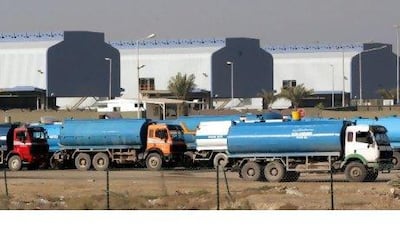DOHA // Experts are calling for a new regional centre to help stop the cost of water and energy production in the Gulf from spiralling out of control.
With some GCC countries diverting up to 40 per cent of their oil for domestic electricity production - much of it to desalinate water - governments are seeking the help of private companies.
"Water and energy are interconnected," said Dr Walid Saleh, the regional co-ordinator of the Institute for Water, Environment and Health at the United Nations University in Dubai's International Humanitarian City.
"And their infrastructure costs are expected to reach hundreds of billions of dollars by 2025.
"Six to 18 per cent of a city's energy demand is used to produce, treat and transport water globally," Dr Saleh said at the 10th Gulf Water Conference in Doha this week.
For some countries in the GCC, those figures are much higher - up to 40 per cent for Kuwait, though the UAE figure is just 8 per cent. If more Gulf countries follow Kuwait's example, the consequences could be disastrous.
"[It's] a major obstacle in the growth and development of the region," said Dr Saleh.
Air conditioning and desalination are huge consumers of energy - and all but unavoidable, especially with a population growing by two per cent every year. In terms of water consumption, though, Dr Saleh said the GCC could reduce demand by 35 per cent if residents started paying for excessive use.
Dr Thameur Chaibi, the head of rural engineering at the National Research Institute for Rural Engineering in Tunisia, said per capita water availability in the Gulf is expected to fall by half by 2050.
Doha, for example, has only enough stored water to last for two days if desalination ceased. Even the biggest storers, Dubai and Kuwait, have enough for just six days. Those figures are alarming, says Dr Saleh.
And power plants themselves use lots of water in their cooling systems. Indeed, Dr Saleh said per capita energy consumption in the region is 60 per cent higher than the average in the 34 industrial nations of the Organisation for Economic Cooperation and Development.
So far the Gulf has done little to use its abundant resources of wind and solar energy. In terms of generation, "they are negligible because they only constitute 0.1 per cent of the total energy supply", said Dr Chaibi.
The challenge, he said, is to ensure governments use their revenue from oil to fund these operations before that revenue runs dry.
"The burden of the electricity sector on government finances is still increasing in many countries and it's becoming unsustainable," said Dr Chaibi.
The solution could be to involve the private sector in the power industry - but that has yet to happen to a great extent. "No government can afford the amount of investment needed for the infrastructure of water and energy [in the next decade]," said Dr Saleh. "So they are seeking to bring the private sector into play."
But there also needs to be a regional approach.
To that end, there are renewed moves to set up a GCC-wide research centre to partner with private-sector companies.
"We proposed this in 1999 but they are talking about it now," said Dr Saleh. The idea would be to gather regional scientists and institutions, such as Masdar City and the Qatar Foundation, to develop new technologies that could be built locally.
"We don't have to keep importing," said Dr Saleh. "Eventually we can have a full-blown desalination unit that was born in the region."
He said regional centres that specialise in research and development should be brought together.
"We can't continue each country simply working separately," added Dr Saleh.
"We're all in the same boat, so why don't we create this research hub to share the experiences we've had and the information we [possess]. Water is life and the way we are wasting it in the region is almost a crime."

